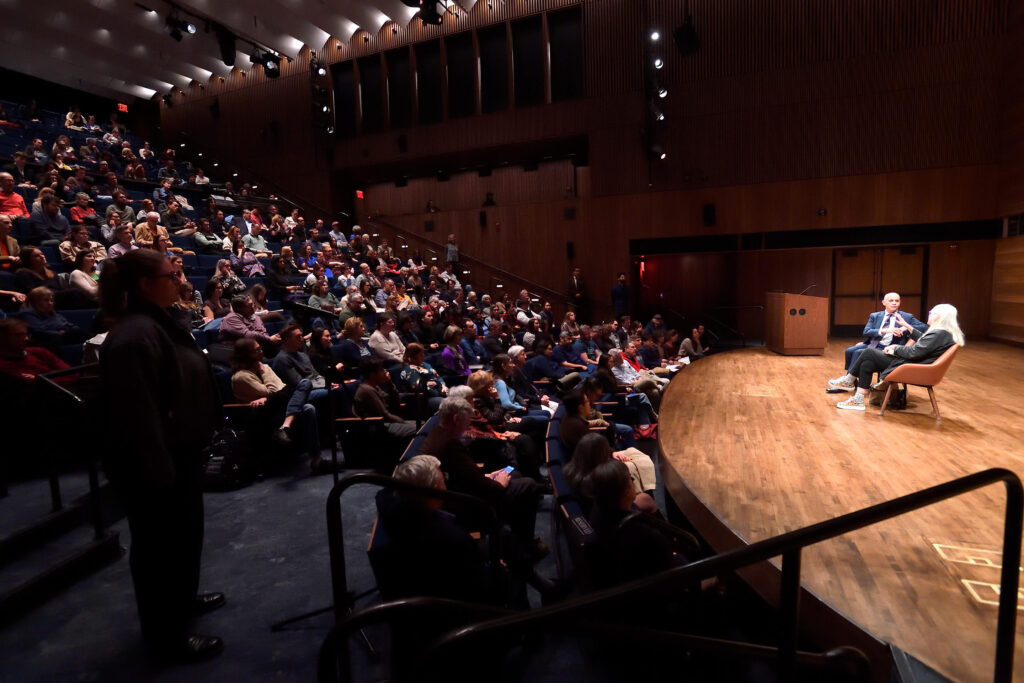Malone Center members Mark Dredze, Emily E. Haroz, Joel Bader, and Kathryn McDonald are among the recipients of the latest round of Nexus Awards bestowed by the Johns Hopkins University.
The 38 projects funded this round span every academic division of the university and include nearly 150 scholars exploring a range of topics, including bird flu preparedness, improving primary care, AI-enhanced health care, and global humanitarian food assistance.
This is the third round of funding distributed via the Nexus Awards, a $15 million program designed to support research, teaching, and event programming at the Johns Hopkins University Bloomberg Center, which officially opened in the fall of 2023. Funding for award recipients began July 1.
“Since 2023, faculty from across our One University have harnessed Nexus Awards to bring our Hopkins Bloomberg Center to life as a hub of robust debate and dialogue,” says Ron Daniels, the president of Johns Hopkins University. “We are grateful to sustain this tradition with a third cohort of Nexus Awards recipients, who will continue to mobilize ideas, expertise, and insights to help address society’s most challenging concerns.”
Responsible AI for Health Symposium (RAIHS) at HBC, a project on which John C. Malone Professor of Computer Science Mark Dredze and Emily E. Haroz, an associate professor of mental and international health, are investigators, won a Nexus Award in the Convening category, which provides funding for the development and execution of an academic or policy-focused conference or conference series.
Organized by the Carey Business School’s Center for Digital Health and Artificial Intelligence and slated for Fall 2025 in Washington, D.C., the symposium aims to bring together roughly 150 experts across academia, government, health care, and industry to address emerging challenges in the responsible use of AI in health care, focusing on fairness, transparency, governance, safety, and real-world applications. The event will directly address one of the most pressing challenges in modern health care: how to safely and ethically integrate AI technologies into patient care, clinical workflows, and health systems.
“RAIHS brings together diverse voices to discuss one of the most critical issues in AI: how to ensure that rapidly evolving medical AI systems are safe, ethical, and equitable,” says Dredze. “I’m excited to help shape these conversations and highlight engineering innovations that can advance responsible AI practices.”
“Receiving this award underscores the importance of the work being done at RAIHS,” adds Haroz. “Moving beyond theoretical discussions to establish clear frameworks for governance and real-world application of AI in health care is paramount. We are excited to contribute to shaping a future where AI is a trusted and beneficial tool in every aspect of health.”
Joel Bader, a professor of biomedical engineering, additionally won an award in the Convening category for his proposal, AI-Enabled Synthetic Biology and Biosecurity.
Also a recipient of a Convening award, the project Transforming Measurement to Drive Quality Outcomes and Reduce Costs: Providers, Payors, and Policymakers, and Patient Aligned in Care Transformation (PACT) includes Bloomberg Distinguished Professor of Health Systems, Quality, and Safety Kathryn McDonald as an investigator.
The project’s goal is to create sustainable improvements in health care by aligning and synergizing the work of health systems, payors, and policy makers, bringing together experts to collaboratively design meaningful metrics that increase quality, value, safety, and equity.
“Engineered for impact, this convening grant will produce a pathway for metric redesign that minimizes burden and amplifies the conditions for scalable, system-wide improvement,” says McDonald. “As a systems scientist, I will focus on bridging measurement and meaning—facilitating methodologies that help the convening participants rethink how quality metrics can drive practical care transformation.”
McDonald is additionally a collaborator on Embedding Neighborhood Nursing in U.S. Health Policy Systems: A Co-Design Approach to Visualize Health Policy Gaps, Opportunities, and Pathways for Equitable Health Systems Design, which won an award in the Research category, providing funding for either a new area of collaborative work or an expansion of an ongoing area of collaborative work in fundamental, clinical, or applied research or projects within the arts and humanities.
This proposal aims to research and prototype optimal pathways for embedding Neighborhood Nursing into Maryland’s health policy systems by combining systems and behavioral design knowledge with nursing, public health, business, and public policy knowledge to identify policy gaps and opportunities and co-design policy pathways that are useful to the nation.
“By applying design and systems methods, this research project will translate community-centered innovation into executable strategies within complex policy and reimbursement structures,” McDonald says. “I will bring my systems science expertise to the project to visualize hidden barriers and design structural solutions that embed equity and safety into health policy pathways.”
Learn more about the Nexus Awards here.
Image Credit: Will Kirk / Johns Hopkins University
